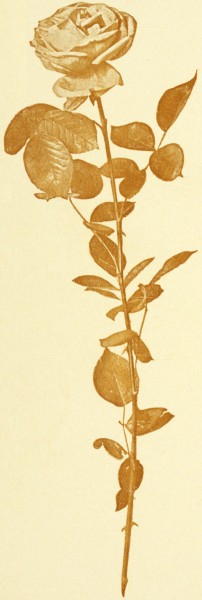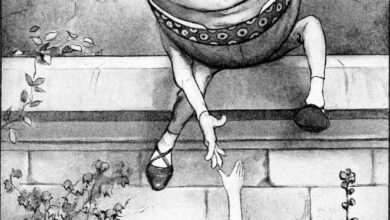
Kitty of the Roses by Ralph Henry Barbour
Chapter I
Through the wide-open window floated in the fragrance of dew-dripping flowers. On the edge of the table a smouldering cigarette sent up a thin, wavering filament of gray smoke that lost itself in the upper gloom of the darkened room, leaving behind it a not-unpleasing odor of the Orient to mingle with the incense from the gardens without. When he paused in his writing—and pauses were frequent—Mr. Stephen Burton’s gaze invariably wandered to the sunlighted morning world represented by the vista at his elbow.
Immediately below him a small, turf-carpeted garden formed a square of shadow and sunlight. A jasmine clambered and sprawled along the purple brick wall at the rear, and a narrow, chocolate-hued bed of moist loam caught the fallen blooms. The bed held white and purple and lavender iris, and spiræa, and blue pentstemon, and was bordered with honey-flower. At the end of the old wall, where it formed an angle with an iron fence, a queerly shaped Daphne-tree threw grotesque shadows on the little lawn. But it was beyond the rusty iron barrier that Burton’s eyes found their richest reward.
There stretched a quadrangle that was bounded by walls on two sides and at the farther end by the back of an old-fashioned Southern house, staid and sleepy-looking, whose second-story porch, half hidden by vines over white-painted iron lattice-work, held a hammock which ever since Burton’s coming had remained idle, swinging lazily in the afternoon breezes. The quadrangle was intersected by narrow red gravel paths bordered by box hedges waist-high. And between the hedges, against the walls, along the fence, and clambering upon the house were roses. Never had Burton seen or dreamed of such roses. The garden was a riot of intense reds, of tender pinks, of flaring yellows and dazzling whites, and of every hue and tint between.
For the most part, they were the favorites of a generation gone: Banksias, festooning the warm bricks with bouquets of amber yellow and of violet-tinged white; Baltimore Belles, creamy-hued and graceful; rosy-violet Pride of Washingtons; sweetbriers of scarlet and blush; Austrian briers, single blossoms of flame-yellow. In the beds were great cabbage-roses of delicate, clear pink and of deep rose; moss-roses of many sorts, crimson Damasks, bright-red Luxembourgs, tiny clusters of flesh-colored Pompons. An immense bush of Gloire des Jardins was aflame with its great double blooms of red, while clustered about it were Madame Cottins, Philippe Quatres, Marceaus, Madame Hardys, Princess Clementines, and Madame Plantiers. The rich crimson, cup-shaped blossoms of a George the Fourth were nodding regally over the yellow-pink blooms of an Emmeline; the brown velvet petals of a Lord Nelson were clustering above a lowly Wellington; while, supreme in one three-cornered jungle of color, a spreading bush of Queen Victoria, an offshoot of the parent stem, showered the ground with its glowing petals.
Above the farther wall leaned a magnolia, a portly, eminently respectable magnolia, spreading its long branches far out over the garden as though offering old-gentlemanly protection to the rose-ladies. In the long afternoons the green and bronze foliage, now reflecting the morning sunlight from its varnished surface, made a pleasant gloom thereabouts, throwing great gently-moving ovals of greenish shadow over the rosebushes along the old wall; here was the Giant of Battles, with petals so darkly red as to verge upon black, and the Duchess, with old-fashioned blooms, globular, chary of petals, showing yellow at the heart when fully opened to the sun, and of a rare old shade of pink that made one think of lavender-scented brocades and was like the inner surface of a sea-shell.
Many a rose bloomed there whose name was no longer known, whose origin was forgotten with its grower, but which, nameless and unpretentious, leafed and budded and flowered season after season, year after year, gladly and humbly fulfilling its mission and setting an example which many of the far-heralded and perverse beauties of the garden might well have emulated.
In one corner dwelt a foreign colony of hardy phlox, white, scarlet, and crimson, tall and vigorous as they needs must be in order to reach the sunlight above the great rose-bushes and to maintain their hard-won footing. And here and there, aliens too, yuccas shot their great spikes above the wilderness of bloom and swung their panicles of cream-colored bells, whose tinkling the birds and bees alone might hear, in the languorous morning breeze. Fallen petals splashed the level tops of the box hedges with brilliant colors, and, when a vagrant wind set the blooms a-nodding, fluttered to the gravel paths and so drifted like scented, tinted snowflakes to and fro. In the shadowed corners of the hedge closely woven spider webs were jewelled with dew-drops and, when the moving leaves let the sun-flecks through, gleamed and sparkled like silver filaments hung with diamonds and blue pearls.
For the fiftieth time since breakfast Burton looked up from the littered table and gazed over the scene, inhaling the intense yet delicate perfume and bathing his sight in the little sea of color with a sensation of almost physical delight. And as he looked, there stepped into the scene a flower that dimmed the others as the moonlight dims the first faint radiance of the stars. He dropped his pen, heedless of the fact that it rolled over his clean sheets leaving a broken trail of ink, and leaned towards the casement with eager eyes and quickened breath.
The flower was dressed in white, in hue a modest blossom enough, its only color being a sash of lilac ribbon about its waist. On its head—for, after all, what does it matter if metaphors are mixed?—was a broad-brimmed garden hat wound about the crown with a filmy white veil. It—she—carried a basket in one hand and with the other held up daintily the skirt of her gown. For a moment she stood on the topmost step in the green shadow of a yellow Banksia, small, graceful, a very rose herself, and the fairest, daintiest in all the garden. Burton’s papers rustled in the tiny morning breeze and fluttered unseen one by one to the dark-hued, highly polished floor. He leaned an elbow on the sill and, without shame, kept his eyes upon the denizen of the rose-garden. After a moment of smiling survey of the scene the girl descended the steps and, basket at side, threaded the paths, snipping here and there with a pair of tiny scissors held in a gloved hand until the basket was filled and weighted with pink and white blossoms.
Yet all the time the broad brim of her hat threw a soft shadow across her face, and it was not until she paused beside the iron fence to clip a single cluster of crimson Damasks that the watcher in the window was rewarded with a clear view of her features. Perhaps, for a Northerner, Burton was impressionable. At all events, it is a fact that when she lifted her face for a moment in an idle glance towards the neighboring house and the light fell fully, boldly upon it, his heart leaped chokingly and then, with a series of disconcerting bumps and thuds, raced faster than it had within his memory. And yet the glimpse he had was but a fleeting one, for the girl’s eyes encountered his own, and after a look of infinitesimal duration, a look pregnant with surprise and dismay, were swiftly lowered, while a faint blush crept over the warm, clear skin. The next instant the shadow had descended again; another, and she had turned away, blossom-laden, towards the house. Burton gazed after her, his mind a confused memory of warm, brown hair and clear, startled brown eyes; of a tender, oval face, southern-hued, sun-lighted; of small, red lips, upon which a little glad smile was fading before a look of confusion. Up the path she went, with never a look behind, yet not hurriedly; plainly, she wanted it understood that here was no rout, but merely a retirement in good order before a superior and better-positioned force. Suddenly from an open window of the house above her a voice called, a man’s voice, languidly imperative,—
“Kitty! Kitty!”
“I’m coming,” called the girl. She flew lightly up the steps, the door was opened from within by invisible hands, and the girl and the blossoms disappeared. The door closed with a subdued slam.
Burton drew a long sigh and mechanically picked up his dead cigarette.
“Kitty,” he murmured under his breath; and again, “Kitty!”
Then, with the cigarette burning, he blew a cloud of purple smoke out of the window into the June sunshine and nodded his head confidentially towards the garden and the house.
“Kitty of the Roses,” he whispered.
Chapter II

Towns, like persons, have individuality, some distinct, others indistinct. By the individuality of some we are attracted, by that of others we are repelled. There are some that are sour, selfish, intent only upon themselves, that give us a scowl of suspicion for greeting and turn their shoulder as one who would say “I don’t know you and I don’t want to. I am very busy; keep out of my way.” Then there are towns that shout us a laughing “Hello,” that shake our hand and pat our back, merry, care-free, pleasure-pursuing towns these that make us welcome so long as we laugh and sing with them, but have no love for us when we frown or weep.
There are frankly mercenary towns whose greetings are shrewd and sober and whose eyes seek our pocket-book even as the door closes behind us. In such towns our welcome is likely to be just as long as our bank account, but, at least, we will find no hypocrisy. And then there are towns that are like—well, like a genial, kindly-faced fellow who sits on a bench in the sunlight whittling a stick, gives us a neighborly nod and moves along that we may sit beside him. He doesn’t take our hand, he doesn’t look askance at our frayed cuffs and battered valise, but, after awhile, if he likes us he offers us a stick that we, too, may whittle, or, maybe, he shoves his tobacco along to us. Perhaps as we sit there in the sunlight and watch him we wonder why he doesn’t work; after we have stayed awhile we cease wondering and find ourself content to whittle and smoke in the sunshine and let the world wag along.
And there are many other sorts of towns, just as many as there are sorts of personality; hard, cross-grained towns; fretful, grumpy towns; alert, busy, inhospitable towns; lazy, dirty towns; nervous, hysterical towns, and mean, rapacious towns. It takes all sorts to make a world, and even in the worst of them, if we know them intimately enough, we may find virtues large enough to atone for the faults. And all this sermonizing merely as an introduction to a little country town that is barely on the ordinary map and that not one person in fifty—no, not one in a hundred, perhaps—has ever heard of.
Belle Harbour is a town that whittles in the sunshine. It is a sleepy, good-natured, courteous old town with a picturesque past and a dubious future.
I would much rather not venture upon exact dates, but Belle Harbour was something of a place when the British marched on Washington, and a house that does not lay claim to having served as a Hessian barracks, a British hospital, or a general’s residence, is so indecently modern that good citizens view it askance. Belle Harbour dozed quietly until the Civil War disturbed it. Even then it bore excitement with a sort of calm dignity. When the war was over it relapsed into slumber once more and now nothing save the last trump will ever fully awaken it.
But it’s a fine old town, a town with a dignified past, with substantial red brick mansions set just back from its broad streets, with oaks and chestnuts shading the crumbling brick sidewalks, and magnolias leaning over the mossy walls and rusted fences. Belle Harbour’s streets are wide, not because traffic demands width, but because when the town was laid out there was a great deal of room and it seemed a pity not to make use of as much of it as was possible. So on Belle Harbour’s main streets ten vehicles could very easily pass side by side. Not that they ever have or ever will; the sound of one mud-splashed buggy rattling over the paving stones is an event that causes great interest, while the simultaneous appearance of two vehicles produces a condition of mild panic up and down the streets. Next to the low curbstones the worn, irregular paving stones show signs of travel; but for the rest, the streets are wild wastes of weeds and grass, wherein here and there a splash of color tells where an adventurous garden flower, aided by bird or breeze, is striving to colonize the wilderness.
Life flows very evenly, very quietly, and, I think, very happily in Belle Harbour. Children are born, grow up, marry, and die without moving out of sight of old Christ Church, save, perhaps, for a brief but adventurous journey to Washington, Richmond or the coast. Business sometimes takes the Belle Harbour citizen to Washington; sometimes social obligations render a trip to the capital necessary; honeymoons are always spent at Virginia Beach. But for the most part the resident of King’s Street lives his life between the post-office and the Seminary, respectively the Northern and Southern limits of his world. When he penetrates beyond the Seminary it is to drive into the country, perhaps to some decaying plantation. When he goes North of the post-office it is to enter the shabby, care-free negro quarter. He clings very closely to the old traditions, the old customs, the old thoughts. There are no telephones in Belle Harbour, and I doubt if you could find a phonograph in any of the dim, white-walled drawing-rooms. Belle Harbour still shudders when it recalls how, a few years ago, it was threatened with the advent of an electric car line. On that occasion the old town, if it did not absolutely awake, at least turned and muttered in its sleep, disturbed by monstrous visions.
The residents of King’s Street, observing him from behind latticed windows or meeting him on the oak-shaded sidewalk of that grass-grown thoroughfare, wondered who Burton was and why he elected to take up quarters in the town when Washington was less than twenty miles away across the Potomac. The citizens of Belle Harbour entertained no illusions regarding the desirability of their town as a place of sojourn, especially after May; they realized that an elevation of five feet above tide-level does not constitute an ideal situation, and that, judged as a health resort, Belle Harbour was far from being a success. Even admitting the idiosyncrasies of the Northerner, Burton’s presence was inexplicable. Belle Harbour knew something about the Northern traveller, for the town was a Mecca towards which Washington visitors frequently turned their steps. But they seldom tarried; having viewed the old church in which Revolutionary heroes had worshipped, and paid their dimes and quarters for sections of crumbling bricks supposed to have been detached from the edifice walls, but in reality pried out of neighboring sidewalks by enterprising boys, they literally as well as metaphorically shook the dust of the old town from their feet and hurried to the steamboat. Even the commercial traveller took pains to insure the completion of his business before the last boat returned to Washington. The only hostelry in the town confined its ministrations entirely to the citizens, and they seldom penetrated farther than the little, low-raftered bar-room. And so Belle Harbour viewed Burton with extreme but courteous interest.
The information afforded by Mrs. Phillips, of whom the visitor had rented two second-floor rooms for an indefinite period, was limited and unsatisfactory. He was a New York man, she confided, and an architect; he had his meals sent to his rooms and ate three eggs every morning; he found Belle Harbour very picturesque and interesting, and wore pink and blue pajamas; he made strange drawings in books and did much writing; he smoked cigarettes or pipes all day long and dropped the ashes on the floor. King’s Street heard these facts with avidity and reiterated “Why?” And Mrs. Phillips only shook her head and murmured in tones of finality,—
“Well, you must remember he’s a No’therner!”
Burton’s conduct on the afternoon of the day which had given him his first glimpse of the girl in the rose-garden did nothing to dispel the growing conviction that there was something strange and mysterious about his presence in Belle Harbour. Armed with a sketch-book, he wandered aimlessly the length of King’s Street, smoked four cigarettes in the shade of the church-yard chestnuts, and subsequently wandered aimlessly home again without once having set pencil to paper or, apparently, having seen aught but the end of his well-made nose. King’s Street whispered behind its sun-repelling jalousies. And yet Mrs. Phillips’s information, as far as it went, was quite correct, and the mystery was apparent rather than real.
Stephen Burton was an architect. A commission for a costly church edifice for a wealthy congregation in a New Jersey residential village had sent him South in search of details of pure Colonial architecture. He had found more to interest him in Belle Harbour than he had anticipated or than its citizens knew of. The old church was a veritable mine of valuable material, and certain old doorways and gables and porches scattered through the town and over the adjacent country were far too interesting to allow of neglect. Being a man of comfortable means, Burton’s profession was a passion rather than a trade; he could and did afford to accept only those commissions that appealed to him, but having once taken them he put his very best into each, with the result that he was already known, at thirty-eight years of age, as the foremost man in the line of his selection—church and public edifices. He had already spent a week in Belle Harbour; there was no hurry; if he liked, there was another week at his disposal. With an office force that could be entirely depended upon there was no good reason for returning North until it suited his pleasure. This afternoon New York seemed utterly repellent to him; a hot, noisy, dusty city in which were no rose-gardens and no girls in white gowns gathered at the waist with lavender ribbons. Deuce take New York!
When he gained his room, the rear apartment that overlooked the side yard, his first action was to go to the window and survey the prospect. He found it disappointing. The roses were there, to be sure, and the hammock; but roses and hammocks do not always in themselves satisfy. He lighted a pipe and wondered a trifle impatiently why the denizens of the house beyond the box-hedged garden kept indoors when there was a cool and shady porch and a comfortable hammock awaiting them. He felt somewhat aggrieved over it. When Bob—the general factotum of the establishment—brought up his supper and set the frayed white cloth over the table Burton contemplated making inquiries as to the occupants of the house at whose blank windows he had been gazing for the better part of an hour. But on second thought he refrained; there was something alluring in the thought of nursing his ignorance; he could give his fancy full swing and make of the rose-filled space beyond the iron fence an Enchanted Garden and of the girl in white an imprisoned Princess. The idea appealed to him, and he recalled with satisfaction that the voice he had heard calling from the house—that is to say, Castle—had sounded Blue Beardish to a degree. So he merely sent Bob for a fresh syphon of soda and uncorked the bottle of Scotch whiskey with a thrill of something approaching excitement.
Burton frequently wondered, when he gazed about his apartments, why he had thought it necessary to rent two rooms from Mrs. Phillips. So far as space went one would have been quite enough. The front room overlooked King’s Street, or would have done so had the trees which grew close to the windows allowed, and was broad and long and high, with white walls and ceiling against which three old yellow-stained steel engravings looked lamentably inadequate. Even the big four-poster bed seemed lost in the immensity of the apartment. The rear room was more cheerful. It was no smaller and there were the same glaringly white walls, but the furnishings were more numerous and the adornments more ambitious. Here he was the proud possessor of six pictures, a framed sampler, three advertising calendars, and two lithographed mottoes. He never tired of studying the sampler; its artistic effects fascinated him even though the information conveyed was but slight:
A b c d e f g H i j k l m n O p q r s t u V w x y z &
Elizabeth R. Warren1827 1838
It was the border of purple, green, and yellow roses that awakened his enthusiasm, and the queer little something—which might have been an hourglass and might have been a dressmaker’s form—which divided the dates at the bottom. As for the mottoes he found less in them to care for. “Give Us this Day our Daily Bread” was hackneyed and incomplete, while “Dare to do Right” had so many violent comparisons of color that none would have thought of paying heed to its advice. The pictures were uninteresting, a few depressing, a few inexcusable, even when their period was taken into consideration. Aside from the sampler, the most artistic of the wall-decorations, Burton decided, were the three calendars.
The furniture was all of it good, if somewhat out of repair. The big lounge was of mahogany veneer with a high, straight back of such delightfully simple lines as to atone for the slippery, inhospitable horsehair with which it was upholstered. There were some good chairs, a folding card-table, a swell-front, claw-footed lowboy, and a solid mahogany desk, beautiful enough to drive a man to theft. The floor was polished until it shone, and over it were scattered four rag rugs whose tones of gray and brown or gray and blue were a delight. After a week of practice Burton was able to step upon these rugs without having them slide from under him. But he never became proud and careless, and this evening as he carried the bottle of Scotch across to the table he held his breath and only felt quite safe when he had lowered himself carefully into his fiddle-back, rush-bottomed chair.
The table was placed by the window commanding the Castle, and during supper he studied speculatively the pregnability of the place. What he saw delighted him. The rose-vines made it possible to attain the second-story balcony with a minimum of exertion. With the Princess once in his arms—— He paused suddenly just there and closed his eyes, striving with a pleasant warmth under the pocket of his negligee shirt to imagine the situation thoroughly. With the Princess in his arms! With those wide brown eyes just under his own and the pearl-like cheek within reach—— He shook his head and opened his own eyes, which, by the way, were steel-colored and not brown, and looked across the two gardens to the Castle.
“If I had you there, Princess,” he murmured, “I very much fear we would never escape from the Ogre. We should be caught like rats in a trap—I think that’s the correct term, though hardly complimentary to you—up there on the balcony. Personally, I wouldn’t much care; with those lips of yours where I could reach them, my dear, the Ogre might do his worst and be hanged to him; but then there’s you to think of. On the whole, perhaps it would be best if I had you rescued by proxy. There’s Bob, for instance!”
He smiled broadly at the thought and refilled his glass.
“Once down from the balcony, the rest would be simple. A wild flight through the rose-garden, a perilous surmounting of the iron fence, a swift rush down the side yard here, and then a trusty steed in waiting,—you see, my dear, an automobile would be out of the question on these funny roads of yours,—and the wide world before us!”
He lighted a cigarette and leaned out over the casement. The evening shadows were blurring the rose-blooms, and high overhead a half moon was sailing out of a bank of fleecy clouds. The Castle showed a solitary light in the window beyond the balcony. He blew a puff of smoke towards it.
“Kitty—Kitty of the Roses,” he murmured, “do you want to be rescued, dear?”
From the house came the sound of a girl’s voice in song, sweet, caressing; he could not distinguish the words, and in a moment the voice was stilled.
He waited and listened, but the silence held. With a little laugh at himself, Burton arose and lighted his lamp.
“I’m afraid you don’t, my dear,” he said. “You’re too happy. Don’t you know that real Princesses are never happy?”
He lowered the shade with a last look into the darkened garden and resolutely took up his papers.




